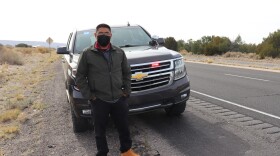Savannah Maher
Savannah comes to Wyoming Public Media from NPR’s midday show Here & Now, where her work explored everything from Native peoples’ fraught relationship with American elections to the erosion of press freedoms for tribal media outlets. A proud citizen of the Mashpee Wampanoag tribe, she’s excited to get to know the people of the Wind River reservation and dig into the stories that matter to them.
Savannah got her start in journalism reporting for her hometown’s local newspaper (The Mashpee Enterprise) and public radio station (WCAI), and has since contributed to New Hampshire Public Radio, High Country News, and NPR’s Code Switch blog. She graduated from Dartmouth College in 2018.
-
COVID-19 relief funding includes $20 million for indigenous language programs. Critics say the money is spread too thin to make a difference. They say the investment is too little, too late.
-
Tribal forces can investigate and hold non-Native Americans while waiting for back up from state police or federal officers, but they can't arrest them. Tribes say that means criminals going free.
-
People who live on America's 326 Indian reservations often have a harder time voting due to bad roads and lack of formal addresses. The pandemic is adding challenges.
-
After three years of isolation and disease testing, the bulls are headed from Montana to tribes in Kansas, Wisconsin and Alaska. Buffalo were once the center of tribal economies and spiritual life.
-
"Fall is the annual middle finger this country gives Native Americans," says one member of the Oglala Lakota Nation.




